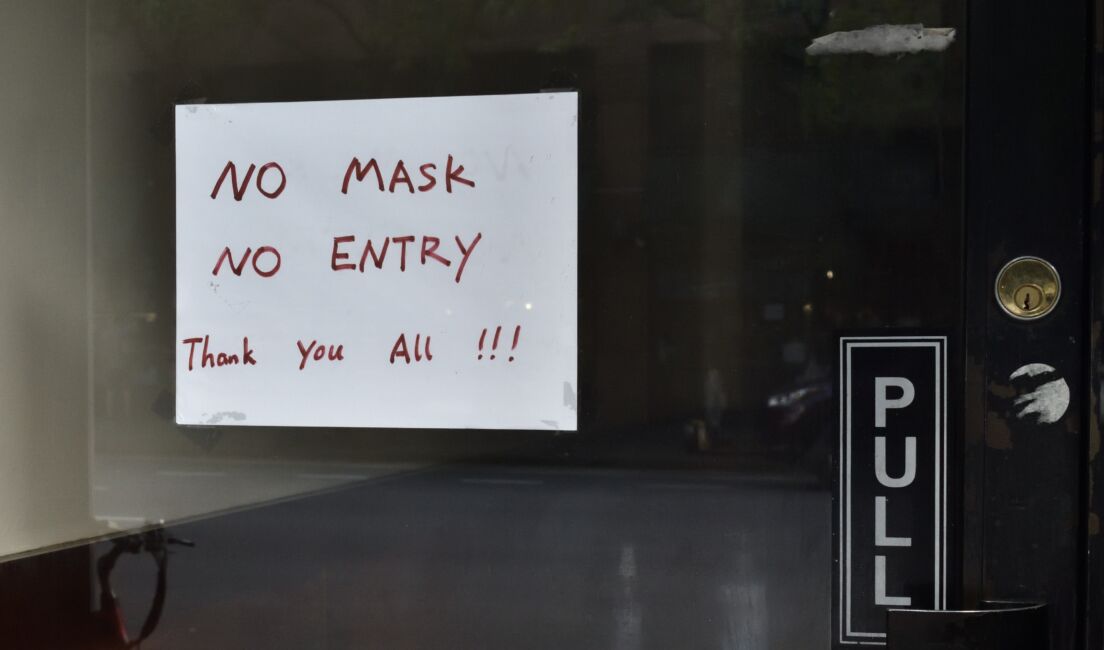A tangible symbol of our polarization, the limits of empathy, and 5 more links worth your time
To Mask or Not To Mask

“If you want to wear a mask and live in fear the rest of your life, it’s certainly your prerogative.…I would rather die from coronavirus than to live the rest of my life in fear and wearing a damn mask.”
Aubrey Huff, retired Major League Baseball player on Twitter (June 16, 2020)
“People seem worried about their ‘rights being taken away’ by being asked to wear a mask…it really shouldn’t be a debate. If you care about human life, please…just #wearadamnmask and encourage those around you to do the same.”
Jennifer Aniston, actress and star of Friends on Instagram (July 1, 2020)
A concrete symbol of our differences
Looking for a symbol of polarization in the United States today? Look no further than the face mask. The choice “to mask or not to mask” has become so contentious that, last week, the New York Times declared, “On any given day, somewhere in the United States, someone is going to wake up, leave the house and get in a huge argument with a stranger about wearing masks.”
I haven’t gotten into any fights with strangers about masks, but I certainly have strong feelings on this subject, and I bet you do too. Are our strong feelings the same? Maybe, but maybe not.
Reading the quotes above we all face a lose-lose decision: I can either be a person who just doesn’t care about human life or I can be a sheep who lives in fear and wears a “submission muzzle.” Personally, I don’t actually take healthcare guidance from actresses and baseball players, but I do have friends and relatives who have expressed opinions that sound a lot like these social media posts.
Empathy has its limits, right?
Empathy for people with opposing points of view is all well and good, you might say, when the subject-matter isn’t health. We can, for instance, differ over immigration or trade policy, and, while those disagreements can get ugly and do have practical consequences, they won’t end with me getting a potentially deadly virus. Issues that affect my health, however? There “really shouldn’t be a debate.” Let’s call this the Aniston Theory.
The Huff Theory, on the other hand, might go something like this: my life isn’t really worth much if I am forced to live in a manner that robs me of the things that give it meaning. You have a right to do as you like and to think what you want, but on this issue—my right to live as I want—I will not give an inch.
Persuasion requires empathy
If the goal of either of these positions is to convince you to change your behavior (to wear a mask or not wear a mask), both “arguments” are missing something important: empathy. Empathy is not for points of view but for individuals, and if we want to convince an individual to do something, we must first attempt to understand and share her feelings. We can only productively discuss differences of opinion when we’re not entirely focused on proving one another wrong.
Our 5 links this week include recent content on the “to mask or not to mask” debate. I hope you’ll use these, along with your own strong point of view on the subject, to engage with others empathetically, whether you agree or not.
5 more links worth your time
- The Dudes Who Won’t Wear Masks, The Atlantic – An epidemiologist and professor at Harvard Medical School looks at the reasons why some people won’t wear masks and notes that “trying to shame people into healthier behavior generally doesn’t work—and actually can make things worse.”
- Wearing a mask is for smug liberals. Refusing to is for reckless Republicans, Politico – This article, subtitled “Welcome to Washington’s latest partisan standoff,” was written in early May and reviews the “deeply political and inconsistent” approach to mask-wearing among politicians.
- Fighting Over Masks in Public Is the New American Pastime, New York Times – A round-up of viral videos documenting arguments between strangers over wearing or not wearing face masks.
- Respecting Choices to Wear – or Not Wear – a Mask, Candace Smith Etiquette – A nationally recognized etiquette expert reminds us that “Etiquette calls us to be respectful whether or not we agree with a person’s reason or the choice that the reason supports.”
- R.R. Reno, masks, and the vacuity of social media, Acton Institute Powerblog – Social media can distract us from the self-reflection we need to prepare ourselves to productively address serious disagreements we have with one another. Dan Hugger considers an example related to the mask-shaming phenomenon.
p.s. If you’ve got a political, ideological, or philosophical issue you’ve been considering, email me at jennifer@civilsquared.org and I’ll work with my team to put together a list of articles, issues, and interesting points of view to share with you and others.
Photo by DiFaziography on Adobe Stock